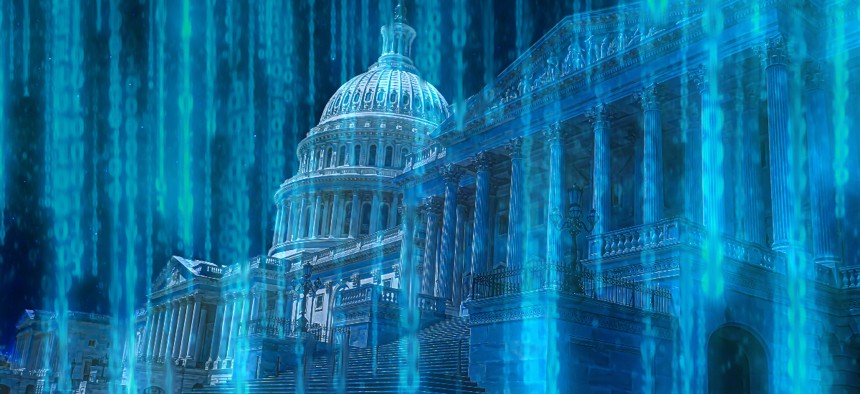Why 2 Lawmakers Turned to AI to Advocate for Its Own Regulation

Olga Kaya/Getty Images
The congressmen have been using artificial intelligence systems to write Congressional texts, as they push for both regulation and innovation in the field.
Two members of the House made waves last week by employing advanced technology to advocate for greater regulation of itself. Reps. Ted Lieu, D-Calif., and Jake Auchincloss, D-Mass., spearheaded conversation about the need for legislative action on artificial intelligence, by using such systems to write a bill and a speech for the House floor, respectively.
Both congressmen, who each have backgrounds in tech sectors, have been busy introducing legislation to regulate and responsibly foster development in the AI sector. Lieu introduced the first bill in Congress that was written with AI, using the popular software ChatGPT.
Speaking with the Washington Post in a live interview on Wednesday, Lieu described the process of using AI to write a proposed piece of legislation as “enthralling,” and also concerning.
“I was blown away by how well it wrote that first paragraph and the fact they could do it [in] under a minute,” he said. “I was also deeply alarmed that it was able to write an amazing paragraph in under a minute that largely aligned with my own views.”
Lieu detailed his experience in writing a bill with AI technology to make a case for sophisticated federal legislation.
“We need to make sure that we use AI for good but also keep it from doing harm to society,” he said.
Auchincloss made a similar play, reading out an AI-generated speech on the House floor when reintroducing the United States–Israel Artificial Intelligence Center Act, which would foster collaboration in AI research and development between the two nations.
Speaking to Nextgov, Auchincloss said that his motivation to advocate for more AI research efforts and regulation within the U.S. stemmed from the looming ubiquitousness of machine learning systems.
“This technology [AI]—I know—is going to be part of my career for decades to come. And it could be a general purpose technology for my children, meaning that, in any sector that they chose to work, it would be a key tool that they would need to use,” he said. “I wanted to spotlight this for Congress so that we have a debate now about purposeful policy for AI and not be 10 years behind the ball, like I think a lot [of] policy was for social media."
Lieu spoke in favor of regulations for AI, and noted that government should be prioritizing the specific technology systems that demand oversight due to their threat potential, such as national security systems or those that could impact road safety through augmented vehicles.
“I don't think it's possible to regulate artificial intelligence in every discrete instance in which it is used,” he said. “I think a better approach is to have a general agency do regulations. And also, when an agency gets it wrong, they can also reverse the decision without having to get another act of Congress to change whatever it is that they initially did.”
As the newest member appointed to the House Committee on Science, Space and Technology, Lieu confirmed he will continue to focus on marrying AI innovation with responsibility—through an announcement written by an AI chatbot. Lieu assured communication staffers that their jobs were not in danger of AI replacement in that same press release.
Lieu conceded during the Washington Post event that AI will cause some level of disruption to the overall job market, both in the elimination and creation of jobs.
To determine the broad impact of AI and how Congress can mitigate the negative and emphasize the positive, Lieu called for a “blue ribbon committee” staffed with experts from industry and academia to help the government navigate AI’s societal impacts.
“It is very important, I think, to have stakeholders and experts—from industry, from government, from academia and other places—look at these issues and really make some good recommendations for Congress on how we proceed forward and what is going to be [an] enormous disruption in the next few years,” he said.






